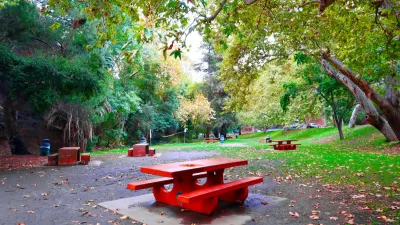Houston’s iconic signature parks mask a major underinvestment in green spaces for most of the city’s neighborhoods, according to a new report.

“Of the 13 U.S. cities with populations over one million, Houston ranks last in city spending for its parks department,” write Guy Hagstette and Elizabeth Love in the Houston Chronicle, quoting a report from the Kinder Institute for Urban Research.
“Neighborhood parks are the workhorses of our parks system, providing Houstonians with close-to-home access to all the benefits that parks provide – a place to play, exercise, enjoy nature and socialize, as well as to cool our neighborhoods and help mitigate flooding.” Although redevelopment funds and philanthropic support have made significant contributions to Houston park spaces, the report notes that “They are not a substitute for the kind of sustained, equitable funding that our neighborhood parks deserve.”
Parks expert Ernest Cook suggests that parks departments can’t rely on cities for their funding, and points to cities where a dedicated funding mechanism has been created for parks. “For example, Minneapolis operates its park system in a separate unit of government with its own taxing authority. Seattle has created a “park district” that provides revenue dedicated to managing the city’s greenspaces, similar in some ways to how our local flood control and hospital districts work.”
The report suggests a few options for Houston, including “exempting park and recreation spending from the tax cap approved by city voters in 2004,” “passing a charter amendment requiring the city to establish a dedicated fund for its parks,” and creating a parks district.
“Houston can be proud of its signature parks. However, this progress masks the poor condition of hundreds of parks, pools and community centers in neighborhoods throughout Houston that only an adequately funded city parks department can equitably address.”
FULL STORY: Houston deserves better parks. Here's how to pay for them. (Opinion)

Alabama: Trump Terminates Settlements for Black Communities Harmed By Raw Sewage
Trump deemed the landmark civil rights agreement “illegal DEI and environmental justice policy.”

Study: Maui’s Plan to Convert Vacation Rentals to Long-Term Housing Could Cause Nearly $1 Billion Economic Loss
The plan would reduce visitor accommodation by 25% resulting in 1,900 jobs lost.

Planetizen Federal Action Tracker
A weekly monitor of how Trump’s orders and actions are impacting planners and planning in America.

Wind Energy on the Rise Despite Federal Policy Reversal
The Trump administration is revoking federal support for renewable energy, but demand for new projects continues unabated.

Passengers Flock to Caltrain After Electrification
The new electric trains are running faster and more reliably, leading to strong ridership growth on the Bay Area rail system.

Texas Churches Rally Behind ‘Yes in God’s Back Yard’ Legislation
Religious leaders want the state to reduce zoning regulations to streamline leasing church-owned land to housing developers.
Urban Design for Planners 1: Software Tools
This six-course series explores essential urban design concepts using open source software and equips planners with the tools they need to participate fully in the urban design process.
Planning for Universal Design
Learn the tools for implementing Universal Design in planning regulations.
Caltrans
Smith Gee Studio
Institute for Housing and Urban Development Studies (IHS)
City of Grandview
Harvard GSD Executive Education
Toledo-Lucas County Plan Commissions
Salt Lake City
NYU Wagner Graduate School of Public Service





























